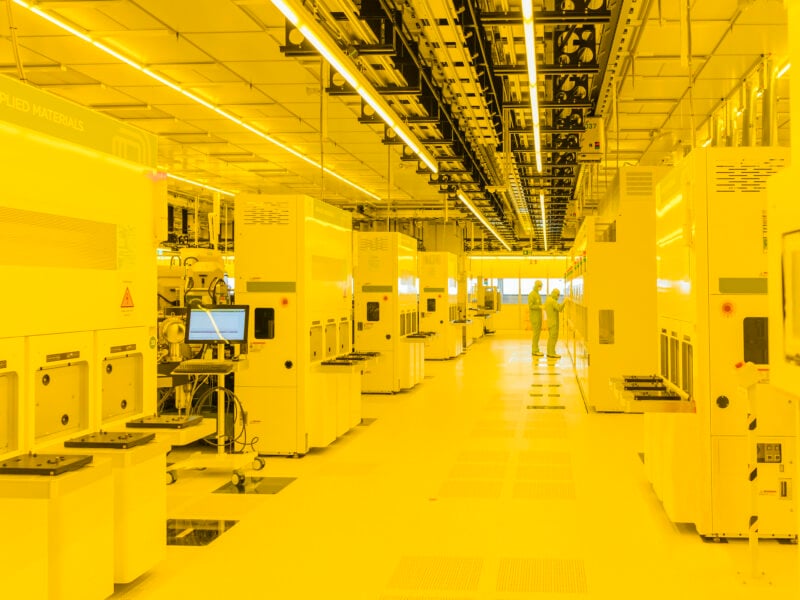
Bosch powers up chip production in Dresden
The importance that German and European industry attaches to Bosch’s new chip production was made clear by the high-ranking (virtual) visitors at the opening: none other than German Chancellor Angela Merkel and EU Vice-President Margarethe Vestager were present when Bosch CEO Volkmar Denner announced the start of operations at the new chip factory. The company has invested around €1 billion in its Dresden facility. Of this, € 200 million is funding from the European IPCEI programme.
In the new fab, Bosch plans to produce mainly ASICS and power semiconductors for the automotive industry and the Industrial Internet of Things on 300mm wafers. It is true that Bosch only builds chips with structure widths of 65nm here – the world’s most advanced chip production facilities already work with structure sizes of 5nm. Nevertheless, Bosch says the new plant in Dresden can be considered one of the most modern chip factories in the world. This is mainly due to the massive use of automation and AI: This makes the plant data-driven and self-optimising.
In the long term, the Dresden semiconductor plant is to provide 700 jobs on a total area of around 72,000 square metres; the first chips are to leave the factory in the middle of the year – but these are not the urgently needed automotive chips, but much less complex circuits for power tools.
Bosch has been building some of its own semiconductors for 50 years. However, all of these go to the “captive market”, primarily to the automotive industry.
In the future, the Bosch plant in Dresden will also build chips for the industrial IoT, a technology area in which Bosch is increasingly involved. Above all, the company sees the connection between AI and the IoT as its sweet spot.
Bosch is also relying heavily on the use of AI in the new production line. There, as Denner explained, the amount of data generated every second is that of a 500-page book. The evaluation of such data volumes, for example to detect anomalies in production at an early stage, is only possible with AI, according to the Bosch CEO.
Bosch wants to gain competitive advantages by building its own chips in the automotive sector primarily because the company has a comprehensive understanding of systems, Denner said in an interview with the Handelsblatt newspaper. “So you have completely different optimisation possibilities between hardware and software. For example, one of the secrets of success of our fuel injection technology also lies in our own integrated circuits,” Denner said.
Yet Europe has not played an important role in semiconductor technology for a long time; Europe’s industry is largely dependent on supplies from Asia when it comes to chips. The chip crisis in the automotive industry made this shortcoming alarmingly clear. Only last week, Infineon CEO Reinhard Ploss described semiconductor technology in a radio interview as “an almost lost industry” for Europe and called for a Europe-wide effort to regain the lost technological competence – not in all areas, but in some specialised sectors.
In the Handelsblatt interview, Franz Fehrenbach, chairman of the Bosch supervisory board, now spoke of a “clear turnaround” in Europe. However, he also called for Europe to invest more in semiconductor technology – not only to reduce its dependence, but also to remain relevant as a technology partner for other regions.
To this end, Europe should define specific technology fields where it has a chance of success. As examples, the Bosch manager mentioned embedded AI, the local intelligence of networked systems including cars, and quantum technology. Hydrogen technology also belongs to these areas, he said. “But we should not spend our money in fields where we have no chance of catching up,” Fehrenbach said.
With the start of production in Dresden, the semiconductor shortage especially for the automotive industry is also far from over. This is not only due to the lengthy production processes for chips, but also because the supply bottlenecks do not only affect Bosch, but practically the entire semiconductor industry. In any case, Bosch’s Denner predicted that the chip shortage in the automotive industry would ease somewhat in the second half of 2021. But the end of the shortage should not be expected before 2022.
Related articles:
NXP: automotive chip shortage to continue
Intel could make automotive chips to ease shortfall, says CEO
Automotive sector helps AI chip startup raise $50 million
Bosch starts 5G automation tests at Dresden wafer fab
 If you enjoyed this article, you will like the following ones: don't miss them by subscribing to :
eeNews on Google News
If you enjoyed this article, you will like the following ones: don't miss them by subscribing to :
eeNews on Google News



